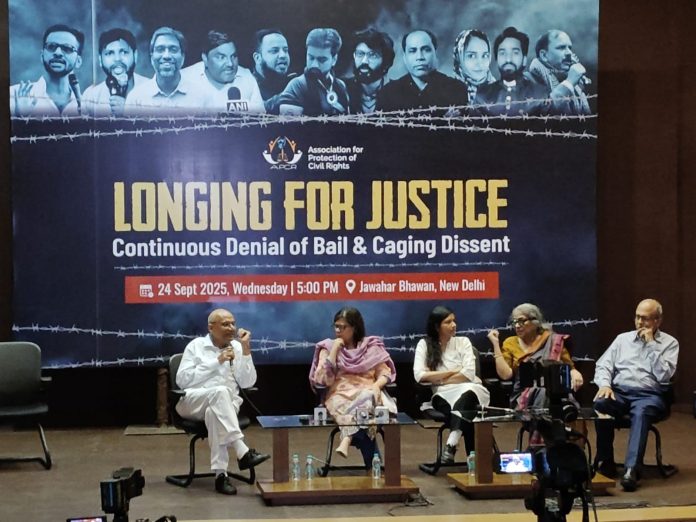New Delhi: A sharp critique of India’s justice system echoed at Jawahar Bhawan as the Association for Protection of Civil Rights hosted a discussion titled “Longing for Justice: Continuous Denial of Bail and Caging Dissent.” Judges, senior lawyers, activists, and artists highlighted the routine denial of bail under laws like the Unlawful Activities (Prevention) Act (UAPA) and the growing criminalization of dissent.
Former IAS officer Kannan Gopinathan, who resigned in protest against the Citizenship Amendment Act and National Register of Citizens, recounted the state’s increasing intolerance. He shared the story of a Bengali woman in Chennai anxiously gathering documents to avoid exclusion from citizenship rolls, warning that preventive detention laws and UAPA blur the line between dissent and terrorism. He urged citizens not to remain silent, saying, “Silence today will be surrender tomorrow.”
Actor Prakash Raj spoke of Umar Khalid, imprisoned under UAPA since 2020, highlighting the courage of Khalid’s friends and father in sustaining his struggle. “To speak out is not politics, it is morality,” Raj said.
Justice Iqbal Ansari, former Chief Justice of Patna High Court, criticized judicial silence, stressing that the essence of democracy is the right to disagree. Supreme Court lawyer Prashant Bhushan argued that charges in the Delhi riots conspiracy case collapse under legal scrutiny and criticized UAPA’s bail provisions that turn pre-trial detention into punishment. Senior advocate Sanjay Hegde noted courts’ reluctance to conduct detailed reviews, leaving bail rare and jail common.
Colin Gonsalves cited the transfer of Justice S. Muralidhar as an example of judicial intimidation, warning that fear undermines judicial independence. Lawyers Nitya Ramakrishnan and Warisha Farasat highlighted expanded police powers and judicial hesitancy, which leave dissenters caged indefinitely.
The discussion revealed a broader crisis: India’s constitutional promise of liberty and justice is under siege. Speakers emphasized that confronting injustice today is crucial, and that the freedom to dissent is the foundational liberty upon which all others rest.




